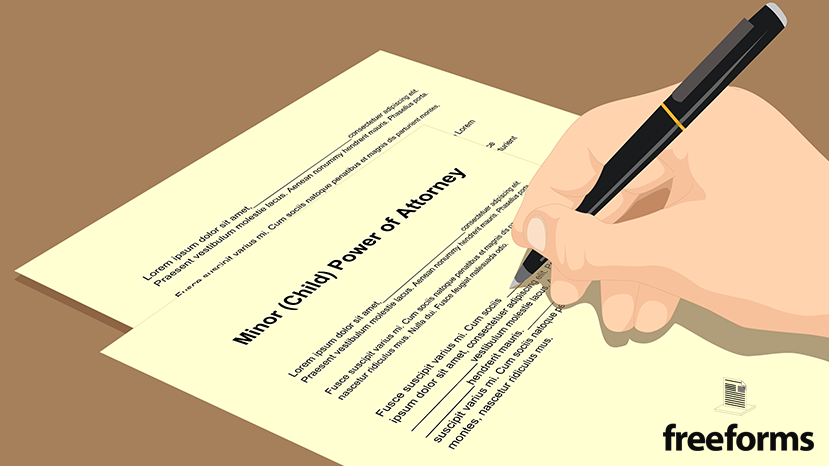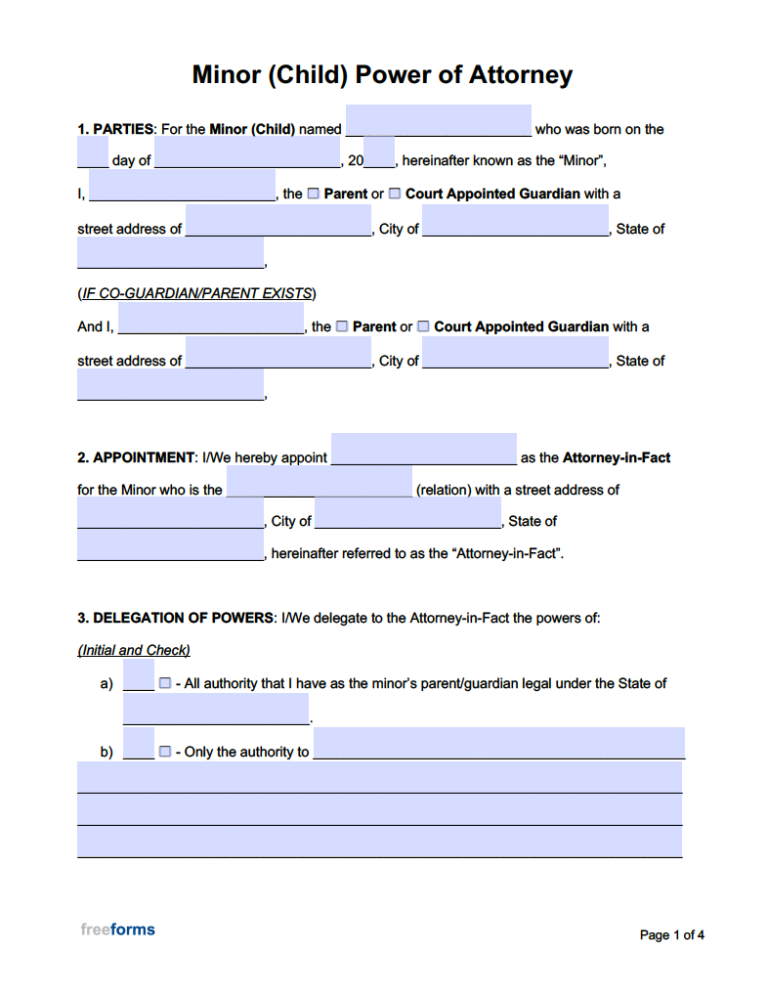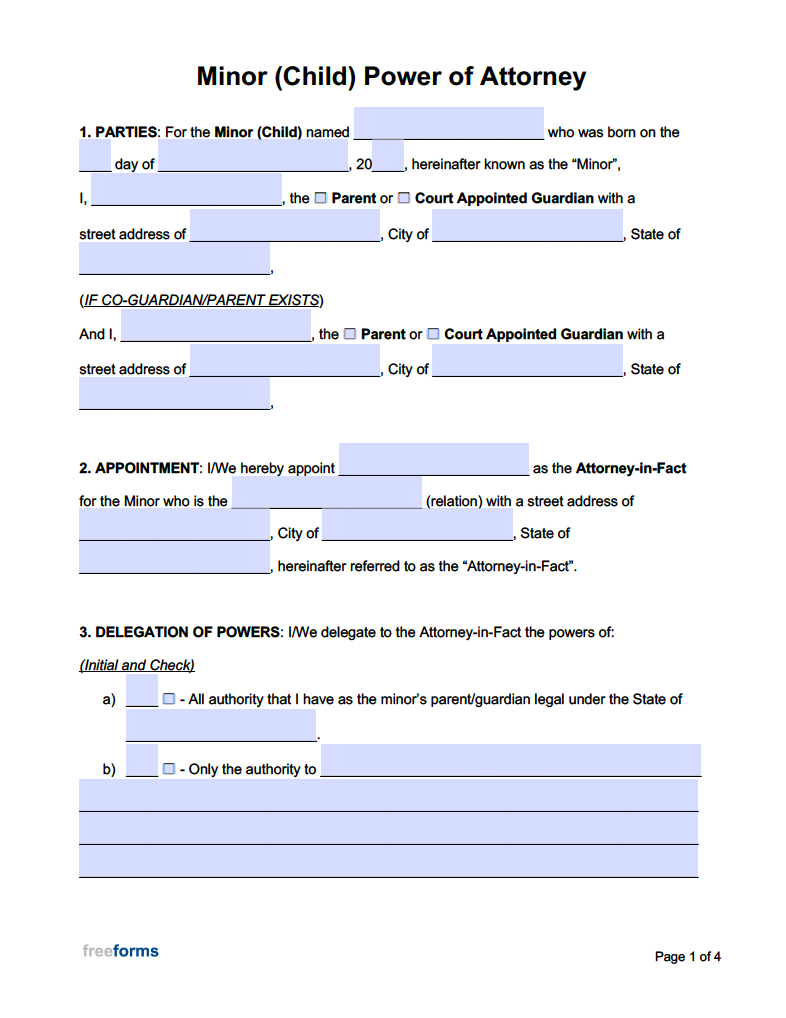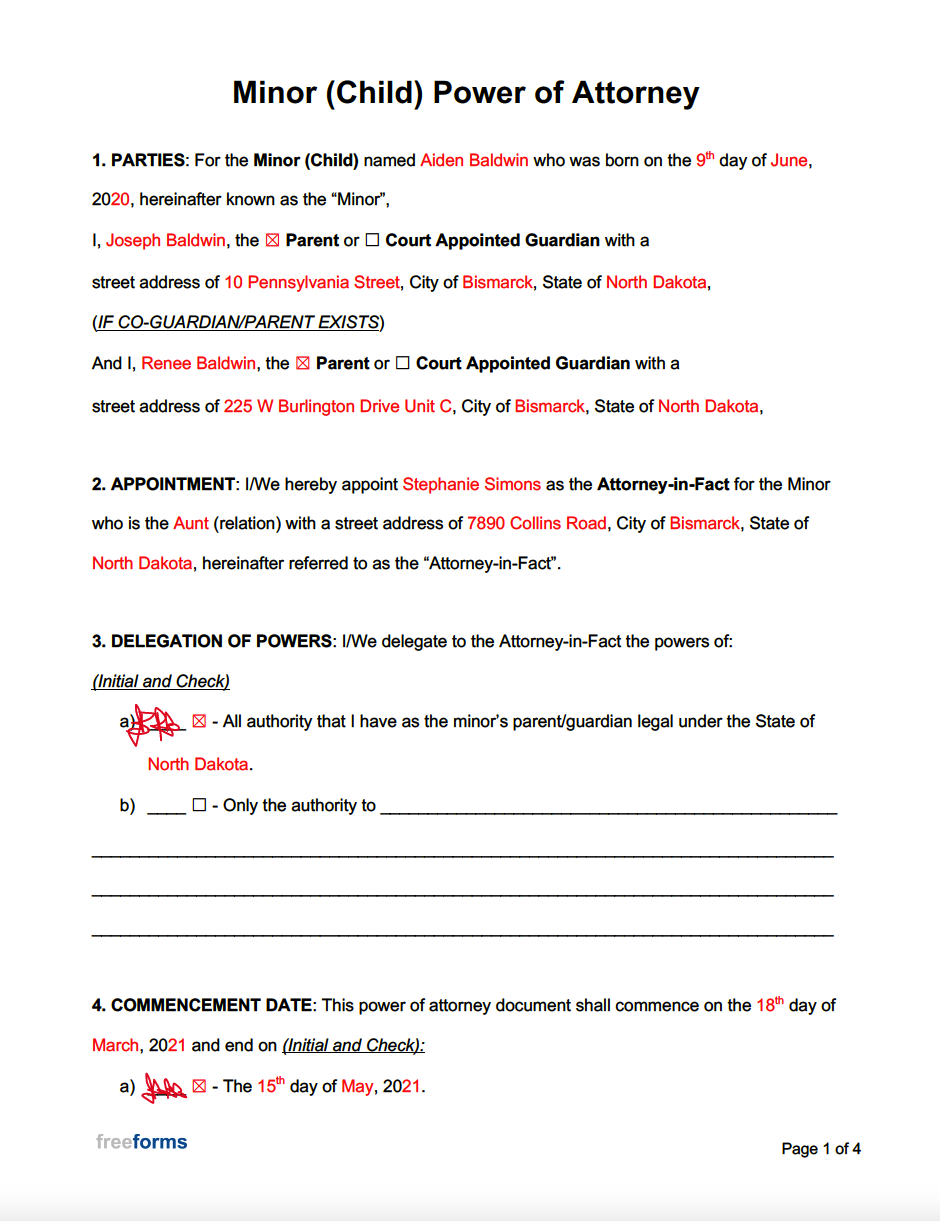Forms By State
- Alabama
- Alaska
- Arizona
- Arkansas
- California
- Colorado
- Connecticut
- Delaware
- Florida
- Georgia
- Hawaii
- Idaho
- Illinois
- Indiana
- Iowa
- Kansas
- Kentucky
- Louisiana
- Maine
- Maryland
- Massachusetts
- Michigan
- Minnesota
- Mississippi
- Missouri
- Montana
- Nebraska
- Nevada
- New Hampshire
- New Jersey
- New Mexico
- New York
- North Carolina
- North Dakota
- Ohio
- Oklahoma
- Oregon
- Pennsylvania
- Rhode Island
- South Carolina
- South Dakota
- Tennessee
- Texas
- Utah
- Vermont
- Virginia
- Washington
- West Virginia
- Wisconsin
- Wyoming
What is a Minor Power of Attorney?
A minor power of attorney is a legal instrument temporarily transferring defined parental rights to an alternate adult. The granted powers allow a secondary individual to make decisions, sign, and care for a minor without the child’s parent(s). The interim agreement extends additional controls over a child to an indicated agent without voiding any existing rights held by the parent(s).
When Can a Power of Attorney for a Child Be Useful?
Situations can arise where one or both parents may not be present to care for or represent their child for a long time. The arrangement can be beneficial in the event the legal guardian(s) is unavailable due to:
- Vacation Plans
- Temporary Occupational Relocation
- Military Deployment
- Scheduled Surgery
- Long-Term Physical or Mental Health Issues
- Incarceration
Another possible use for this POA is when a minor is enrolled in a boarding or preparatory school out of state. The agreement can permit an appointed school official to make medical decisions for the child on behalf of the parent(s).
Which Parental Rights Can Be Allocated?
When seeking to distribute parental authority, the child’s guardian can adjust the terms to endow the necessary choice controls to the nominated agent. Specific restrictions can be denoted within the written commitment to establish that only the desired privileges are delivered on a per-case basis. Agency can be granted to allow the attorney-in-fact established power(s) to perform the listed acts on behalf of the child regarding medical care, education, and extracurricular activities:
- Provide Childcare and Housing
- Make Decisions
- Endorse Documents
- Schedule Appointments
- Access Records
- Other Specified Tasks
This type of contract is instated for short-term use, and each state sets unique regulations concerning the maximum period of issuance. For cases that demand a more permanent arrangement, review your state-specific page listed above for details on guardianship options.
How to Get a Minor Power of Attorney
- Step 1 – Choose a Designated Agent
- Step 2 – Fine-Tune the Terms of the Agreement
- Step 3 – Complete and Execute the Form
Step 1 – Choose a Designated Agent

Creating a child POA agreement essentially allows the parent(s) to identify a third party to assume standby guardianship over a minor. Determining a recipient of parental authority should be carefully considered, reserving the designation solely for persons deemed trustworthy, reliable, and responsible. The confirmed agent should also be competent and experienced in caring for children and be able to provide financial stability and safe home conditions.
Step 2 – Fine-Tune the Agreement/Obtain the Right Form

After confirming the selection for attorney-in-fact, the applicable agreement can be accessed to read over and amend as needed. The following terms can be adjusted at the discretion of the parent(s):
- Start/End Date
- Durability of the POA (Termination pon death and/or incapacitation)
- Limitation(s) on Powers Granted
Once the parameters of the accord are set, the appropriate form can be obtained for completion. First, select the link corresponding to your state of residence and then download, print, or complete within your browser by using the Fill Now function.
Step 3 – Complete and Execute the Document

Next, the blank sections of the form can be filled in with the requested information on the parent, child, agent. When it comes time to finalize the agreement, endorsements can be captured in accordance with state signature requirements. If your state specifies a demand for authorized corroboration to confirm the event, all participants must wait to sign the document until a notary and/or witness(es) are present. Check your state’s page to review any necessary mandates to adhere to legal standards for the contract’s execution.
State-Specific Child POA Time Limitations and Laws
| STATE | MAXIMUM TIME PERIOD | MINOR POWER OF ATTORNEY LAW |
|---|---|---|
| Alabama | 1 Year | § 26-2A-7 |
| Alaska | 1 Year | § 13.26.066 |
| Arizona | 6 Months | § 14-5104 |
| Arkansas | No Specified Time Limitation | § 28-68-213 |
| California | No Specified Time Limitation | § 1510 – 1517 |
| Colorado | 1 Year | § 15-14-105 |
| Connecticut | 1 Year | Sec. § 45a-622 |
| Delaware | No Specified Time Limitation | § 2361 – 2372 |
| Florida | No Specified Time Limitation | § 751.01 – 751.05 |
| Georgia | 1 Year | § 19-9-122 |
| Hawaii | 1 Year | § 560:5-105 |
| Idaho | 6 Months | § 15-5-104 |
| Illinois | No Specified Time Limitation | § 755 ILCS 45/4-3 |
| Indiana | 1 Year | § 29-3-9-1(c) |
| Iowa | No Specified Time Limitation | § 633B.213(1)(a)(1) |
| Kansas | 1 Year | § 38-2403(d)(2)(A) |
| Kentucky | 1 Year | § 403.352 |
| Louisiana | 1 Year | § 9:952 |
| Maine | 1 Year | § 5-127(1) |
| Maryland | No Specified Time Limitation | § 13-901 – 13-908 |
| Massachusetts | 2 Years | § 201F-5 |
| Michigan | 180 Days | § 700.5103 |
| Minnesota | 1 Year | § 524.5-211(a) |
| Mississippi | 1 Year | § 93-31-3 |
| Missouri | 1 Year | § 475.602(1) |
| Montana | 6 Months | § 72-5-103 |
| Nebraska | 6 Months | § 30-2604 |
| Nevada | 6 Months | § 159A-205 |
| New Hampshire | No Specified Time Limitation | § 463:1 – 463:33 |
| New Jersey | 6 Months | § 3B:12-74 |
| New Mexico | 6 Months | § 45-5-104 |
| New York | 1 Year | § 24A-5-1551 |
| North Carolina | No Specified Time Limitation | § 32A-28 – 32A-34 |
| North Dakota | 6 Months | § 30.1-26-04 |
| Ohio | No Specified Time Limitation | § 1337.28 and § 3109.52 |
| Oklahoma | 1 Year | 10 O.S. § 700 |
| Oregon | 6 Months | § 109.056 |
| Pennsylvania | No Specified Time Limitation | § 23-5611 23-5616 |
| Rhode Island | No Specified Time Limitation | § 33-15.1-14 |
| South Carolina | 60 Days | § 62-5-309 |
| South Dakota | 6 Months | § 29A-5-210 |
| Tennessee | No Specified Time Limitation | § 34-6-302 |
| Texas | 1 Year | § 34.0075 |
| Utah | 6 Months | § 75-5-103 |
| Vermont | No Specified Time Limitation | § 14 V.S.A 2601 – 3098 |
| Virginia | 180 Days | § 20-166 |
| Washington | No Specified Time Limitation | § 11-125-410 |
| West Virginia | 1 Year | HB § 49-8-3 |
| Wisconsin | 1 Year | § 48-979 |
| Wyoming | 1 Year | § 3-2-302(d) |
Frequently Asked Questions (FAQs)
Power of Attorney vs. Guardianship for a Child
A minor power of attorney agreement, sometimes referred to as standby guardianship, is different from legally permitting another to receive official guardian status. The primary difference between a POA for a child and guardianship is the amount of time the bestowed parental rights are upheld. A child power of attorney accord extends temporary privileges for an alternate adult to care for a minor when the parent is unavailable or unable to do so. Most states provide specific statutes indicating the maximum time period the controls can remain in effect.
Guardianship is typically a permanent arrangement that not only appoints another to receive parental authority to another but can mean the rescinding of the current parent’s rights. Becoming a child’s guardian usually involves a more lengthy process that can include going through the court system and possible approval from a judge.
Does the Form Require Notarization?
Policy regarding the obligations for recording signatures on the contract depends on the state in which the child resides. Examine the unique requirements applicable to your area by clicking on the link for your state’s page. Although some states do not demand notarization to activate the commitment, it is highly suggested for verification purposes.
Will I Need a Lawyer to Issue Power of Attorney Over My Child?
No, retaining the services of an attorney is not necessary to instate a child POA commitment. Completion of the form by the child’s guardian furnishes sufficient legal standing to transfer parental controls upon endorsement by the connected parties.
How Do I Revoke a Minor Power of Attorney?
Should a parent wish to void the granted permissions created by the POA contract, they have the right to revoke at any time. The effective reversal of the arrangement can be carried out by filing a Revocation of Power of Attorney. The revocation agreement can be completed as instructed to record the information from the original POA document. The parent(s) can then execute the legal instrument per the signature requirements of their associated state. A copy should be supplied to the named attorney-in-fact to inform of the retraction of the previously-issued agency.
Sample Minor Power of Attorney
Download: Adobe PDF, MS Word (.docx)


